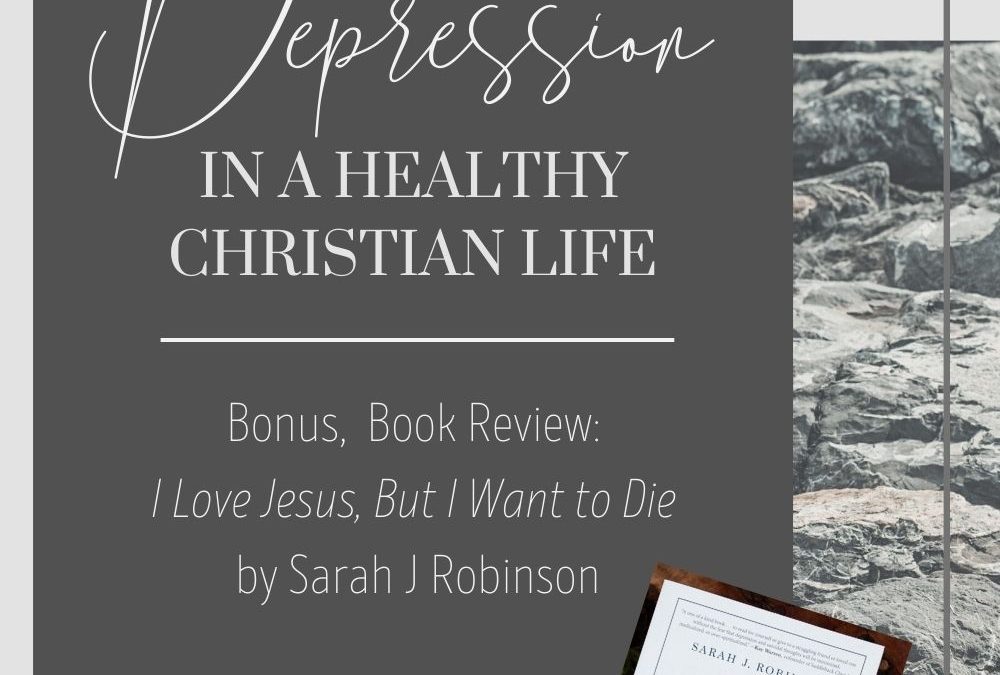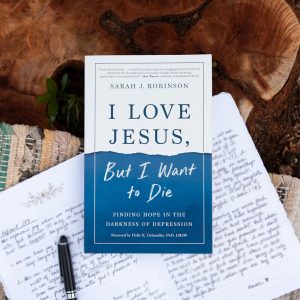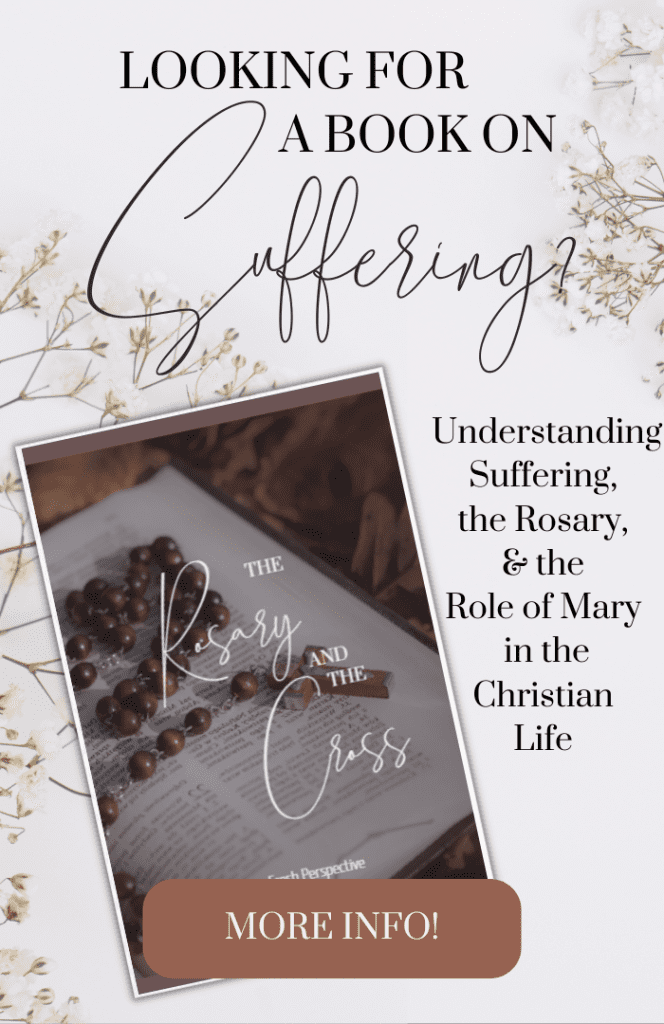I recently had the privilege of reading a beautiful new book by my dear friend Sarah Robinson called I love Jesus but I want to Die – Finding Hope in the Darkness of Depression. It was a powerful, beautiful book about the reality and pain of depression and suicidal thoughts/tendencies and how God can find you there.
I cried my way through it.
Having lived many similar experiences personally, Sarah’s work was well written, healing, and hopeful.
The premise of the book was that the problem of depression is real and we need to do everything we can to stay alive and well because life is worth living anyhow, because God is good and He loves you.
I agree with her wholeheartedly ❤ There is a place for therapy and self-care. God’s plan for you certainly doesn’t include you cutting short your own life, and if you are teetering on the brink of that, well, desperate times call for desperate measures, and you may need her tips to learn how to find the best therapist for your needs. However, once we can get to a slightly more objective place, I think the most important truth she lands on in Chapter 11 that one of the most important things we can do with our depression is to “sit in the dark”.
Sit in the Dark
We are here.
There is something cathartic about admitting reality. It’s dark.
There’s no use running from it, pretending it’s not a problem, letting the world tell us that being depressed and wishing for death is abnormal or wrong. As Sarah notes, there is nothing worse than hyper-spiritualizing the whole affair and saying that if I just loved Jesus more, prayed more, volunteered more, I wouldn’t want to die.
No, there is beauty, grace, and healing, to be found in surrender.
This life is a hard place filled with hard realities. As beautiful as this world is, we are not made for this world.
This world and all its therapists would have you believe that if you are dissatisfied with your life that there is something wrong with you and that you just need to immerse your self ever more deeply in the “healthy pleasures” this world has to offer (deep breathing, sunsets, time alone, healthy boundaries, Journaling, solitude, friends, a nice cup of tea, etc) that we would find ourselves happy to be alive again, or at least able to stop contemplating suicide.
But what if that doesn’t work?
What if, even after you’ve purged your diet and taken up some endorphin boosting exercise routine which you protect with every fiber of your being, you still find yourself struggling with depression?
Sarah concludes that sometimes this is just life, so you take your meds, see your therapist and, push through because God is good and sometimes we are just sick… and that’s OK.
But I’d like to suggest that there is another missing element!
Depression and the Christian Life
I’ve read multiple articles about how we are only stressing ourselves out more by trying to find purpose in our pain so I won’t suggest that you sink down and start asking God why, but I wonder if the depression we face might be more than an obstacle to our living a joyful Christian life. Instead of a problem to be overcome, I wonder if it is just the invitation we’ve been looking for to pursue a deeper intimacy with God.
Misunderstanding Self-Care
The goal of self-care is survival, to help us find some little joy in this world that we can hang on until He comes for us, and ideally, do it with a smile…. and that is all we can hope for. That, by the world’s definition, would be a life well lived, a “Saint”, the best that we could hope for.
But I wonder if all this hype about self-care, filling up our own cup, being wholly satisfied by a morning walk and some healthy boundaries, is really doing the good that it claims to be responsible for.
We are spiritual beings. No matter how “healthy” our self-care is, it will never satisfy our need for God.
So… what, then? Do I add prayer to my self-care routine?
Sure, for a while anyway. but even then, what you are doing is still an effort to take care of YOURSELF (I mean, it’s in the very definition of the term!) It’s still you exerting this superhuman effort to be happy, to be satisfied with this life when everything in it isn’t enough.
[mailerlite_form form_id=14]
Giving up and Being Invited
This is the point where they tell you, with great compassion, “Oh my dear, I’m so sorry, there are no recourses left for you. You are 1-in-5. Here, take these meds, there is no shame in needing help. Depression is real, and you, unfortunately, are a victim. (Now make the best of it and start a blog on living healthy self-care with depression and thank God for the meds he helped doctors make so you could survive your plight)”
Please, don’t get me wrong, I’ve been in this very spot and have dear friends also in this place. I do not judge them. But I want to propose that maybe, just maybe, there is one step deeper, that this depression and desire for death isn’t so much a plague as it is an invitation, an invitation into a world deeper than this one, a world that requires living by trust and stepping out in faith, not by our own power, but by surrendering to our weakness and letting ourselves be carried. No longer do we take care of ourselves. This is the tipping point where death-to-self can finally happen.
There is Safety in Death
This is why it is attractive. All strivings cease. All requirements to keep ourselves afloat drift away. All focus on being what the world says we have to be drifts away. Anyone who has ever wanted to die knows this. The pain can’t hurt us anymore. Nothing can touch us. It is safe.
The decision to take meds is the American way, the refusal to die. It says, “I’m a fighter, I’ll never give up, That’s what makes me great, successful, admirable in the eyes of others….” (and I’m not saying this is bad, remember, there are times when it might be necessary)
The other decision, however, to “die-to-self”, to surrender, to sit with the dark, to ask God what He wants from you in this moment, to trust and say, “Lord, if it is you call me to come to you upon the water.” Well, that is NOT strength that comes from self-care. It is miracles based on living from a place of love rather than safety. No one can muster of their own strength the ability to walk on water.
Possible Miracles
The world says, practice self-care so you can do what is possible. Stay alive at all costs.
But if you believe, truly believe that He “works all these things together for my good” (Romans 8:28), then we have to believe that somehow there must be purpose in my pain, not purpose I have to understand but purpose I have to believe in.
Our God is a God of the cross. “a man of sorrows accustomed to infirmity” (Isaiah 53:3).
My pain is an invitation into a deeper more mysterious life of miracles, to a life of intimacy with God that is little respected and little understood but nonetheless ultimately safe, the life we were made for, the life in which we forget about the pain of being misunderstood, rejected, and dissatisfied with this life.
[mailerlite_form form_id=14]
I love Jesus, But I want to Die.
Why “but”?
I love Jesus AND I want to die.
I want to die. There is no shame in this. This world does not satisfy me, it’s not supposed to! The depression epidemic with all the refined self-care techniques we’ve come up with are only fueling the belief that we are supposed to be happy in this world. But no, this world is not our home, we are not created for this world. It’s ok not to be satisfied with this world. Surrender to that. Surrender to the idea that there is something more. Something greater. Something better.
Playing Devil’s Advocate
Ok, for the sake of argument, in a sense, we are created for this world and this world is our home. Yes, we have physical bodies that need oxygen, food, motion, and sunshine. This world was created for us, to be the place where we come to choose God or not. The beauties of this life are simply consolations that remind us how desperately we are loved along the way, and the foretaste of untainted joys to come. The downsides are the ones that remind us that it is not where we are meant to stay, and that consolations aren’t everything.
There is no shame in not being satisfied with consolations and foretastes. We were made for the real thing. At a certain point I’d be surprised if all of us didn’t long for death somewhere along the line.
Let’s not forget why we are here.
We are here because Adam and Eve were cast from Eden, from this world in its purest form where they experienced perfect closeness with God. But they chose against Him. This life is our opportunity to seek Eden again… problem is, are we going to seek Eden here by pretending all the discomforts of this life don’t exist, or by seeking a return to the relationship with God from which we were cast.
This is the purpose of “Death-to-self”. Letting go of my own plans, my own desires, the way I think things should be. Letting go of my attempts to care for myself and letting Him lead me back to Himself. Yes, even if He leads me to the cross. In that sacred place of pain and paradox I might just experience the intimacy my soul was made for and a surprising joy I never knew I sought.
[mailerlite_form form_id=1]







